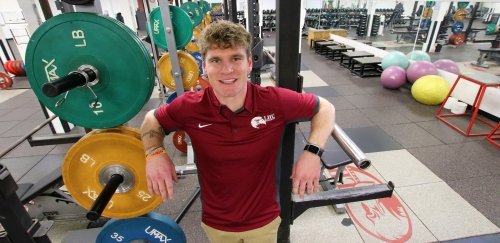
Sport and Performance Psychology (Minor)
Sport and performance psychology provides students with an education based on current best practices stemming from empirical research and applied work. Psychosocial determinants of performance and mental skills training are emphasized throughout the program providing students with strong experiential and research-based learning activities in an inclusive and equitable environment.
- Degrees & Offerings
-
- Minor
- Location
-
- Bloomsburg
- Clearfield
- Lock Haven
- Mansfield
- Department
- Program Contact
-
Professor
Sport and performance psychologists work with athletes and coaches to provide techniques to reach goals and enhance the player's execution. Examples of how sport and performance psychologists are beneficial to athletes include effective stress management, improved focus, reduced risk of burnout, increased confidence, and an overall improvement in mental health.
Students interested in this minor should consult their advisor for information on course requirements. More information will be added to this page when available.
Courses and Curriculum
Sport and Performance Psychology Minor Requirements
- 18 credits required for minor completion
- Students should meet with their academic advisor each semester and use Degree Works to monitor their individual progress toward completion of the minor.
| AASP Certification Course Requirements * = must be graduate level | Courses offered at Commonwealth University |
|---|---|
| K1. Professional Ethics and Standards | SPPP516: Professional Ethics in Applied Sport Psychology |
| K2. Sport Psychology | SPPP510: Foundations of Sport and Performance Psychology SPPP512: Sport Psychology for Performance Enhancement SPPP513: Psychological Aspects of Injury and Recovery SPPP514: Stress Management for the Physically Active |
| K3. Sport Science | SPPP519: Gender and Sports |
| K4. Psychopathology | SPPP503: Mental Health in Sport and Performance Settings |
| K5. Helping Relationships* | SPPP518: Counseling Skills for Sport Psychology |
| K6. Research Methods and Statistics* | SPPP500: Research Methods in Sport Science |
| K7. Psychological Foundations of Behavior | SPPP515: Seminar in Sport Science (if the topic is appropriate – individual course outline must be reviewed by AASP) SPPP504: Cognitive and Affective Bases of Behavior |
| K8. Diversity and Culture* | SPPP517: Cultural & Ethnic Diversity for Sport Psych Consulting |
| Mentored Experience in Sport and Exercise Psychology | SPPP531: Mentored Experience in Sport and Performance Psychology |
- Dissect and synthesize research to develop a full comprehension of current knowledge base
- Assess both quantitative and qualitative methods used in existing research and assess findings accordingly
- Evaluate the influence of key social institutions (gender, race, social class) on sport and exercise experiences, and to integrate these factors in one’s professional work
- Interpret philosophical principles and assess ethical issues related to sport and performance psychology; articulate a professional philosophy regarding engagement in sport and performance settings
- Formulate a strong understanding of the influence of multiple key psychological factors on sport and exercise experiences
- Assess lifespan developmental factors that influence sport and exercise participants’ experiences, and demonstrate the ability to integrate these factors into one’s professional approach
- Appraise sport/exercise performance issues and propose appropriate mental skills training
- Structure a mental training program for individuals and groups based on formal needs assessment and lifespan considerations
- Determine the psychological factors that increase one’s risk of injury/ illness and how to prevent these; delineate one’s response to injury/illness and appropriate coping measures; and analyze issues and theories of transition, notably athletic retirement
- Generate a mental skills training plan for an injured athlete or athlete in transition
- Analyze stress and the interrelationships of stress, health and physical activity.
Careers
Career options associated with the Sport and Performance Psychology include:
Potential Job Opportunities
- College Athletic Department
- Coach
- Mental Health and Wellness Advisor
- Army Center for Performance Enhancement
- AASP Certified Consultant
- Fitness Consultant
- Lifestyle Coach
Applying to This Program
Apply
-
Application Process
Review the step-by-step process whether you're a first-year student, transferring to CU, or more.
-
Apply Now
By starting your application, you gain access to your personalized application portal to view your progress.
-
Scholarships
As the largest comprehensive university in north central and northeastern Pennsylvania, CommonwealthU works hard to provide a world-class education that consistently rates among the best values in the nation.
Explore More
-
Explore Commonwealth University
There's no better way to learn more than to experience Commonwealth University for yourself! Set up a campus tour or connect with us virtually.
-
Connect with Your Admissions Counselor
Applying to college is a big step. You have questions, and we have answers!
-
Understanding Financial Aid
Financial Aid can be a complex topic. Our Financial Aid team is here to tell you what you need to know and help you navigate the financial aid process.

